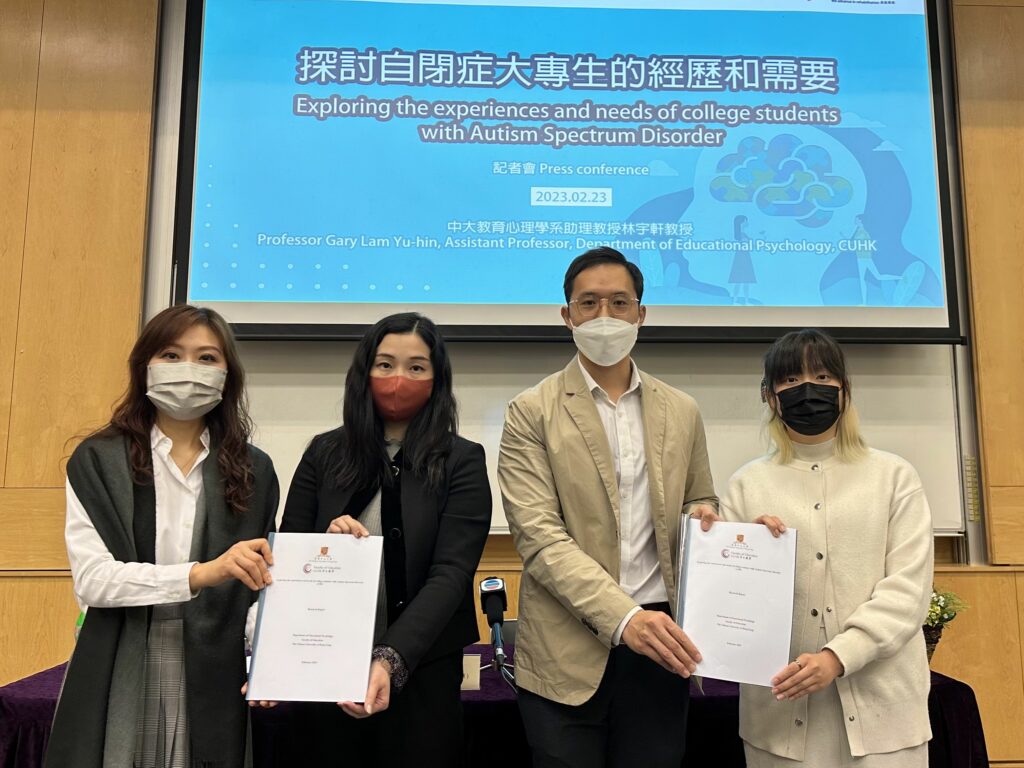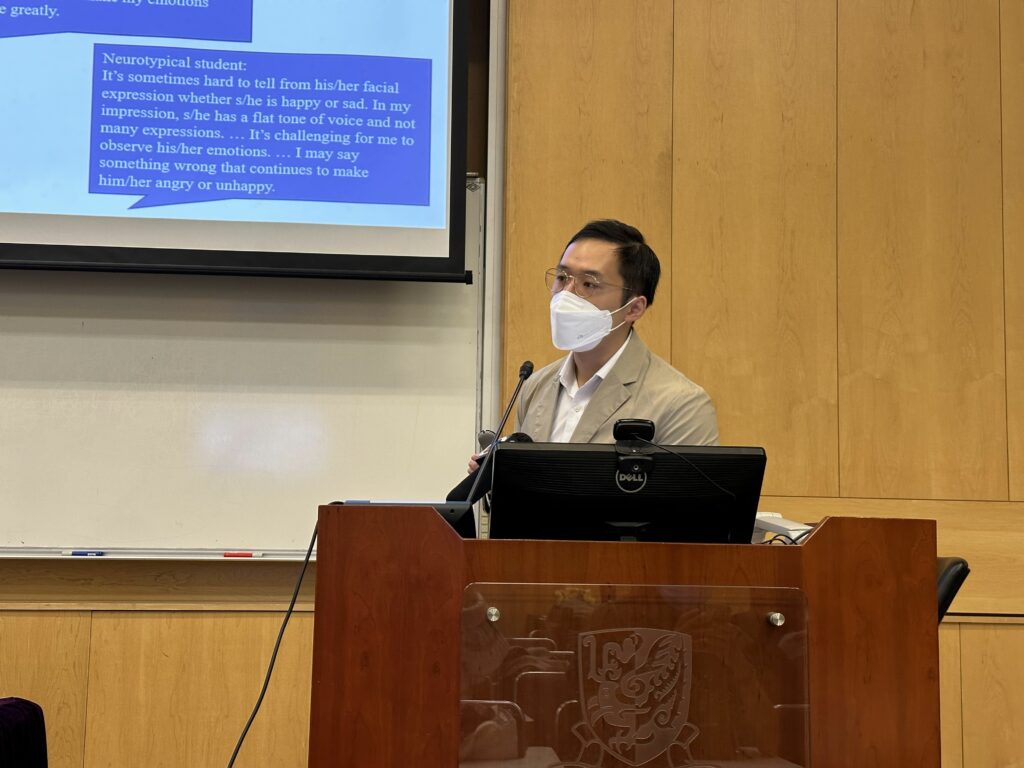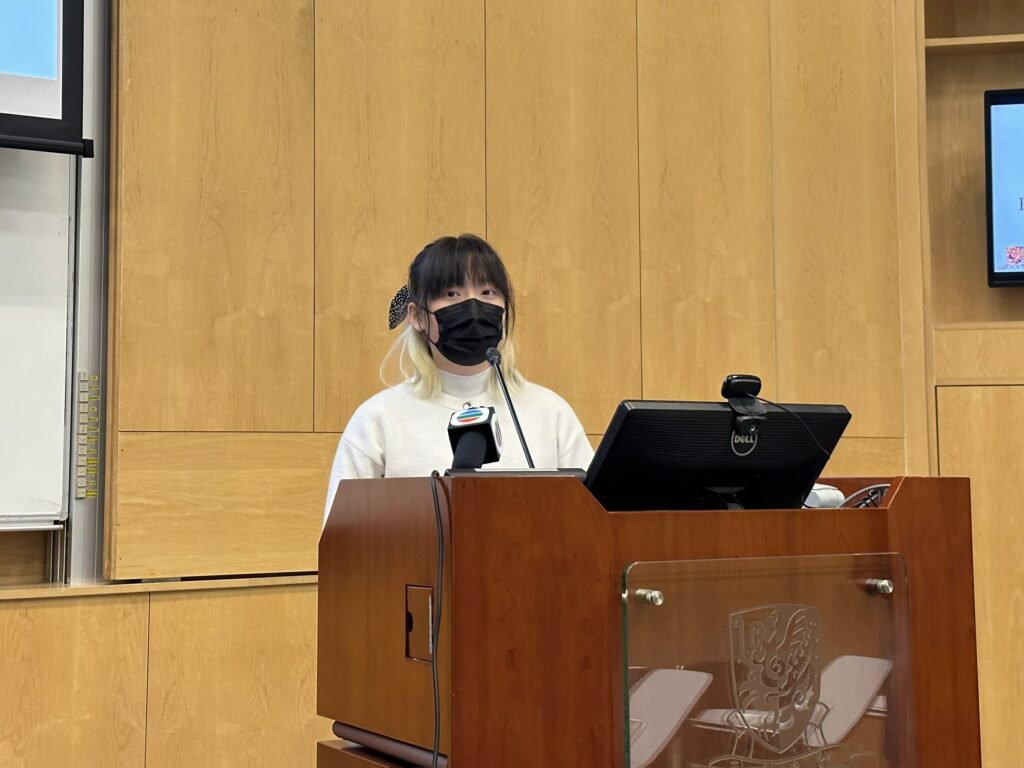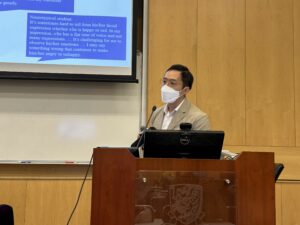CUHK
News Centre
Why university students with autism need systematic support – CUHK study reveals challenges from academic learning to campus life
Funded by the Equal Opportunities Commission and supported by SAHK, a local rehabilitation NGO, Professor Gary Lam Yu-hin from The Chinese University of Hong Kong (CUHK)’s Department of Educational Psychology conducted a study investigating the experiences and needs of college students with Autism Spectrum Disorder (ASD) in Hong Kong. The results revealed challenges in areas from academic learning to university life. The team suggested setting up a systematic support framework across institutions to improve the situation.
Academic, social, and emotional difficulties
The research team conducted in-depth qualitative interviews with 30 students with ASD across Hong Kong’s higher education institutions and some of their families and friends who were willing to speak about their experiences.
In the study, the college students with ASD described post-secondary learning as too abstract and unstructured, without much concrete guidance or explicit learning strategies. Many students struggled with executive functioning difficulties such as time management and higher-order cognitive thinking. Sudden disruptions to learning routines caused by social events and the COVID-19 pandemic were particularly challenging to students with ASD compared to their neurotypical peers.
Navigating the social world in college can also be challenging. Implicit social rules and expectations are complex to discern and understand. A student described communicating with others as “chess playing”: “When playing chess, I have to move without thinking; when communicating with others, I have to respond immediately. They are equally difficult because I must stop and think before making the next move.” Miscommunication and misunderstanding arise frequently in group project collaborations, hostel life and student society activities, resulting in unfair treatment, social exclusion and bullying towards students with ASD.
The study also found that school-related stressors, such as high academic demands and scheduling, and adjustment to stressful situations, such as social events and the pandemic, can easily trigger intense emotional responses in students with ASD, which are not easily discernible or socially expected by others. Some specific sensory stimuli in the college campus and activities requiring high social demands such as orientation activities also triggered their negative emotions.
Misunderstanding and limited support
College students with ASD often faced with stereotypical negative comments, such as “staying in their world”, “bus enthusiast”, “weird”, “don’t need friends”, and “equal to intellectual disability”. Those with little knowledge about ASD may think they “look normal”, “abuse resources” and “get extra benefits easily”. These lead to biased attitudes and even microaggression towards students with ASD, who at times need to overcompensate for their disability or even “pretend to be normal”.
Consequently, many of them hesitate to disclose their ASD or special education needs (SEN) for fear of “getting hurt”, “not getting any additional help” or being perceived as “sadfishing” or “weak”. Some also pointed out that college policies and support are sometimes unfriendly or not transparent, which deters them from disclosing their condition and being able to access services. Even for those who disclose their condition, the ways in which they are accommodated academically are at times too generic, and their quality and effectiveness are not consistently monitored or evaluated.
Recommendations to improve the situation
Based on the findings, the team makes the following recommendations to improve the situation:
- Support framework – Setting up a systematic support framework across institutions with clearly delineated roles and functions of different stakeholders within the college community. A more transparent and well-coordinated provision of support services will help students with ASD navigate the system and obtain the necessary services more smoothly, as well as facilitating communication when students move between institutions. Collaboration with the school system and NGOs can also support students’ transition needs before and after college.
- Training – More training and professional development about SEN, specifically ASD, should be provided to teaching and support staff in post-secondary education. Teaching support in post-secondary settings should focus on enhancing universal strategies that are effective for all students, with or without SEN. Adopting a strength-based approach and providing interventions in naturalistic environments is crucial to the development of students with ASD.
- Awareness – Enhancing awareness and understanding of ASD in colleges and society is paramount to creating an autism-friendly environment and promoting inclusion.
Interviewees
30 ASD students across Hong Kong’s higher education institutions were interviewed. There is considerable diversity in their autistic characteristics and academic backgrounds, representing a wide range of subjects at diploma, associate, undergraduate and postgraduate levels across local UGC-funded universities, self-funded institutions and public post-secondary colleges. Other interviewees included eight parents of college students with ASD, 10 college teaching staff, eight college professional support staff and nine neurotypical students who have experience of interacting with college students with ASD.
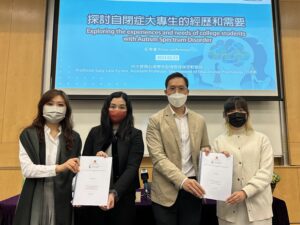
(From left) Dr Joanne Wong Chi-yan, Senior Manager (Clinical Service), SAHK; Ms Doris Tsui, Acting Head (Policy, Research and Training), Equal Opportunities Commission; Professor Gary Lam Yu-hin, Assistant Professor, Department of Educational Psychology, CUHK; and Ms Yu, one of the research participants.


